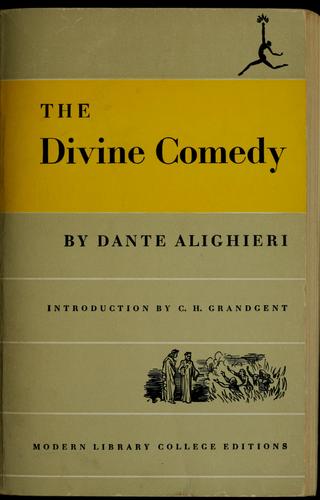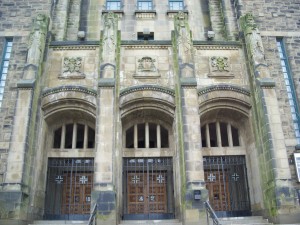Nicholas Graham sent us this email a couple of days ago:
Here is one of the many highlights to be found among Frye’s Dante annotations.
I would like to share it with anyone who is able to throw some light on Frye’s distinctions.
I have asked some of my theologian friends to explain Frye’s distinction between “the Maritains & the Barths”. Also I would like to know a little more about each of the types of visions that Frye presents here.
Maybe you could start an annotations corner on your wounderful blog?
You can see Graham’s transcript of the annotation here. Please have a look, and if you have anything to add, leave us a comment.
The answer to Nick’s question is, yes. We will set up a dedicated space for annotations. We’ll let you know once we get it up and running.,
And, of course, queries of any sort are welcome. We are always glad to post them.
Here are two responses to Graham’s query.
From Bob Denham:
Isn’t the Maritain/Barth distinction simply that Maritain accepted the analogia entis and Barth rejected it. See Barth’s Church Dogmatics, vol. 3, pt..2, trans. Knight et al. (Edinburgh: Clark, 1960), 220. See also Keith L. Johnson, Karl Barth and the Analogia Entis (2010).
I have a brief discussion of Frye and the analogia entis in “Frye and Giordano Bruno,” which has been posted on the Frye blog. In a “General Note: Blake’s Mysticism,” Fearful Symmetry, CW 14:415–16, Frye contrasts Blake’s analogia visionis with “the more orthodox analogies of faith and being.”
Frye’s aligning the four forms of analogia with Dante’s four levels of meaning is a pretty ingenious schematic. Of course Frye’s ultimate commitment is to anagogy, where the principle of identity, as opposed to analogy, operates.
From Michael Dolzani:
My knowledge here is highly limited, despite growing up Catholic; I thought analogia was a girl I went to high school with. However, I think Bob is basically right. The Catholic Maritain accepts the analogia entis and is thus trapped in reason; the Protestant Barth rejects it and manages thereby to open a path to the analogia visionis, to vision, via the Logos. I wonder when these notes were written: this all seems an outbreak of Norrie’s visceral antipathy to Catholicism, which I’ve never really understood.
I know that the Catholic Church of his youth was extremely reactionary, and that he disliked the potential authoritarianism of the neo-Thomist movement, which he saw as parallel to something like Eliot’s Anglo-Catholic insistence on “orthodoxy,” but Catholicism really seems to have been a sore spot. After all, Aquinas may be dryly Scholastic, but I find Augustine’s obsession with sin, damnation, predestination, and the like as repellent as anything in the Inferno. When Benedict recently abolished half of Limbo (the unbaptized infants), there were a lot of articles talking about the historical background; I don’t know if it’s true that where Aquinas said the souls of unbaptized infants were merely denied heaven, Augustine went further and said that they shared to a degree the punishments of the damned–but it sounds like something he’d say.
In short, Norrie saw the shadow side of Catholicism, but seems to minimize the shadow side of Protestantism. It was the Augustinian tradition of obsession with sin and guilt and the corruption of the human will that led to Luther’s tormented ferocity; to Calvinism’s making predestination practically the whole of the Christian message; to the burning of witches; and, after all, Barth’s theology was itself called “neo-orthodox.” Hardly a line of vision. If you wanted to be unfair in the other direction, you could counterpoise all this against enlightened Catholics like Erasmus and Nicholas Cusanus and Rabelais. Norrie knows all this–in fact, he says some of it in Fearful Symmetry. But when he gets emotional he tends to think only of the bad side of Catholicism and the good side of Protestantism.
This kind of visceral dislike is rare in Frye. The only other significant instance of it seems to be occasional reference to dislike of Germans. Is it possible that it’s because he associates both with the fascism whose rise he witnessed as a young man?
In notebook 27, he observes that “fifty years ago the word ‘Christian’ in the name of a political party meant ‘Roman Catholic Fascist'” (CW 5, 91).
And in notebook 50, he remarks parenthetically: “Note: during the war I had a racist prejudice against Germans, feeling that there was nothing so dumb as a dumb Kraut. When Jung started talking about Jewish consciousness and the danger of entering into Oriental attitudes, the farts of a dumb Kraut polluted the air: I think I outgrew that. . .but (as with Spengler) I distrusted the dumb Kraut for a long time” (CW 5, 353).
He may have outgrown his “racist prejudice against Germans,” but he retained undisguised contempt for the fascism he saw at Oxford. In a 1937 letter to Helen Kemp, for example, he writes: “Blunden came back from Germany full of enthusiasm for the Nazis. Poor Oxford always finds itself on the wrong side of a revolution — it gets more Fascist every day” (CW 2, 757). He was still sardonically referring to it in an interview late in life. It’s worth noting that the “wrong side of a revolution” also refers to the English Civil Wars, and is therefore an allusion to Oxford’s longstanding ties to Catholicism.
During my recent trip to the Frye Festival, Ed Lemond took me on a quick tour of Frye’s Moncton, including the route he walked along St. George Street during his “shitty garment” epiphany. This route would have taken the young Frye past the formidable Our Lady-Assumption Cathedral. This imposing structure may well have been associated with the “burden of anxiety” he shook off that day. Here’s a photo of the front of the cathedral — no single photo taken from the street can capture the full looming height and breadth of it.
Finally, returning to Dante, here is a diary entry from January 1950:
Some more Dante: I hate the Inferno, because Dante so obviously believed, not only in a substantial & objective region of torture that never ends, but in all the legal quibbles that entrap divine “love” into sending people there, such as failure to have been baptized. It’s too easy to work out the imaginative aspect of it, the symbolic reasons why Virgil can’t be saved & a perfunctory Christian can be. One still remains stupefied by the perversity of the human mind. Dante saw everything in hell except the fact that to create an imaginative hell and then suggest that it’s real is an act of intellectual treachery to the God in man lower than that of Judas, who may conceivably have acted from better motives. (CW 8, 229)



MAKING CONNECTIONS!
“The final comprehension of the Bible’s meaning is in the spark of illumination between its closing anode [+] and its opening cathode [-], and if that gap were not there the Bible would not stimulate the imagination to the effort of comprehension which recreates instead of passively following the outline of a vision.” [FEARFUL SYMMETRY, 386; CW vol. 14, 375-6]
“…the choice [is] between using the Gospels as spiritual batteries,
so to speak, for charging one’s spiritual batteries, and looking at them objectively as aesthetic productions.” [THE DOUBLE VISION, 72; CW vol. 4, 225]
The consistency of Frye’s thought, it would seem, from his first book, FS, to his last, DV, revolves around the image of batteries or participation rather than aesthetics.
Another striking image in, FEARFUL SYMMETRY, 386, is that of “pulling the Bible around in a circle”. This, I think, is a promise fulfilled in The GREAT CODE, ch. 5. Lonergan (another Canadian giant) in ch. 5 of METHOD IN THEOLOGY (1972) pulls the whole of theology around in a circle by means of what he calls “functional specialization”. I often wonder about what makes Frye special as a literary critic and I think it is the panoramic view which he offers us.
When pushed by questions about specific issues in theology, Lonergan would often reply: “I’m not doing theology; I’m doing method in theology.”I often think that Frye is outstanding because he allows one to view the whole of his subject and, in a displaced form from that of Frye, this is what is special about Lonergan. They are both methodologists or whatever is the anagogic word for methodologist?
My recent surprise in working on Dante and Frye’s annotations to Dante was when I came to PARADISO. In Canto 6 we have a treatment of LAW. In Canto 10 ff. we are concerned with WISDOM. And in Canto 17 we are dealing with PROPHECY.
For Frye’s treatment of all of these topics, in a biblical context, we can hardly do better than to consult ch. 5 of THE GREAT CODE.
Do Frye’s annotations to Dante exist solely in the annotated copy or have they been transcribed and published? If unpublished, what library holds the copy?
Hello, John,
Frye’s annotations to Dante : INFERNO; PURGATORIO; PARADISO;have been transcribed by myself and soon to be published by LEGAS, publishers in Ottawa. A copy of the transcriptions I have sent to Michael Happy and hopefully he can find a suitable corner for them on his wonderful FryeBlog, where they can be accessible to everyone.